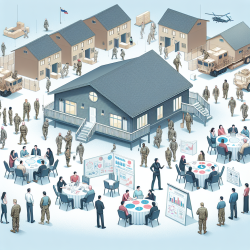The integration of gender expertise within military organizations presents unique challenges and opportunities for practitioners aiming to foster inclusive environments. Drawing insights from the research article "Integrating Gender Expertise into the Canadian Armed Forces: Challenges for Change Agents and Culture Change," this blog explores how practitioners can enhance their skills by understanding the dynamics of gender perspectives in military contexts.
Understanding Gender Expertise in Military Organizations
Gender expertise involves recognizing the different impacts of military operations on diverse groups, including women and men. In the context of the Canadian Armed Forces (CAF), Gender Advisors (GENADs) play a crucial role in integrating these perspectives to align with international agendas such as the Women, Peace, and Security (WPS) agenda. Despite efforts to mainstream gender perspectives, challenges persist due to entrenched masculine cultures and limited representation of women.
The Role of Gender Advisors
GENADs serve as change agents within military institutions, tasked with advising on gender dynamics in both institutional and operational settings. However, their effectiveness is often hindered by resistance to gender expertise at both individual and systemic levels. Practitioners can learn from GENADs' experiences to navigate similar challenges in their own fields.
Challenges Faced by Gender Advisors
- Legitimacy of Expertise: GENADs often face skepticism regarding the legitimacy of their expertise. This skepticism is rooted in traditional military cultures that prioritize masculine norms over gender diversity.
- Tokenism: The numerical dominance of men in military organizations contributes to tokenism, where GENADs are seen as symbolic representatives rather than agents of change.
- Resistance to Change: Military personnel may resist integrating gender perspectives, perceiving them as irrelevant to operational success.
Strategies for Overcoming Challenges
Practitioners can adopt several strategies to overcome these challenges:
- Building Alliances: Collaborate with allies within the organization who support gender diversity initiatives.
- Emphasizing Operational Benefits: Frame gender expertise as essential for operational effectiveness rather than solely focusing on equality.
- Continuous Education: Advocate for comprehensive training programs that enhance understanding of gender dynamics across all levels of the organization.
The Transformative Potential of Gender Expertise
The integration of gender perspectives holds transformative potential for military organizations. By challenging existing power dynamics and fostering an inclusive culture, GENADs can contribute to more equitable institutional outcomes. Practitioners should view these efforts as part of a broader movement towards embracing diversity and inclusion within their own fields.
Encouraging Further Research
This research highlights the importance of understanding lived experiences and power relations within organizational contexts. Practitioners are encouraged to conduct further research on how gender expertise can be effectively integrated into various sectors beyond the military.
Conclusion
The journey towards integrating gender expertise in military contexts offers valuable lessons for practitioners seeking to improve their skills in fostering inclusive environments. By learning from the experiences of GENADs, practitioners can better navigate challenges related to legitimacy, tokenism, and resistance to change. Ultimately, embracing diversity and inclusion is essential for achieving transformative culture change across all sectors.
To read the original research paper, please follow this link: Integrating gender expertise into the Canadian Armed Forces: challenges for change agents and culture change.










